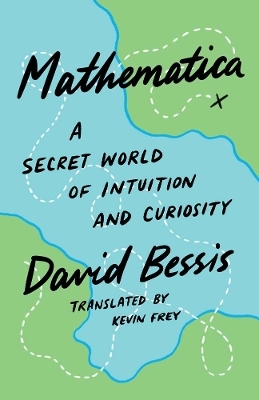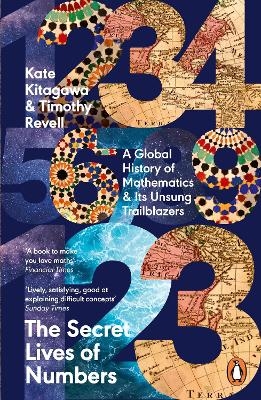
In Pursuit of the Unknown
17 Equations That Changed the World
Seiten
2012
Basic Books (Verlag)
978-0-465-02973-0 (ISBN)
Basic Books (Verlag)
978-0-465-02973-0 (ISBN)
- Titel ist leider vergriffen;
keine Neuauflage - Artikel merken
"Published in Great Britain in 2012 by Profile Books"--T.p. verso.
In In Pursuit of the Unknown, celebrated mathematician Ian Stewart uses a handful of mathematical equations to explore the vitally important connections between math and human progress. We often overlook the historical link between mathematics and technological advances, says Stewart--but this connection is integral to any complete understanding of human history.Equations are modeled on the patterns we find in the world around us, says Stewart, and it is through equations that we are able to make sense of, and in turn influence, our world. Stewart locates the origins of each equation he presents--from Pythagoras's Theorem to Newton's Law of Gravity to Einstein's Theory of Relativity--within a particular historical moment, elucidating the development of mathematical and philosophical thought necessary for each equation's discovery. None of these equations emerged in a vacuum, Stewart shows; each drew, in some way, on past equations and the thinking of the day. In turn, all of these equations paved the way for major developments in mathematics, science, philosophy, and technology. Without logarithms (invented in the early 17th century by John Napier and improved by Henry Briggs), scientists would not have been able to calculate the movement of the planets, and mathematicians would not have been able to develop fractal geometry. The Wave Equation is one of the most important equations in physics, and is crucial for engineers studying the vibrations in vehicles and the response of buildings to earthquakes. And the equation at the heart of Information Theory, devised by Claude Shannon, is the basis of digital communication today.
An approachable and informative guide to the equations upon which nearly every aspect of scientific and mathematical understanding depends, In Pursuit of the Unknown is also a reminder that equations have profoundly influenced our thinking and continue to make possible many of the advances that we take for granted.
In In Pursuit of the Unknown, celebrated mathematician Ian Stewart uses a handful of mathematical equations to explore the vitally important connections between math and human progress. We often overlook the historical link between mathematics and technological advances, says Stewart--but this connection is integral to any complete understanding of human history.Equations are modeled on the patterns we find in the world around us, says Stewart, and it is through equations that we are able to make sense of, and in turn influence, our world. Stewart locates the origins of each equation he presents--from Pythagoras's Theorem to Newton's Law of Gravity to Einstein's Theory of Relativity--within a particular historical moment, elucidating the development of mathematical and philosophical thought necessary for each equation's discovery. None of these equations emerged in a vacuum, Stewart shows; each drew, in some way, on past equations and the thinking of the day. In turn, all of these equations paved the way for major developments in mathematics, science, philosophy, and technology. Without logarithms (invented in the early 17th century by John Napier and improved by Henry Briggs), scientists would not have been able to calculate the movement of the planets, and mathematicians would not have been able to develop fractal geometry. The Wave Equation is one of the most important equations in physics, and is crucial for engineers studying the vibrations in vehicles and the response of buildings to earthquakes. And the equation at the heart of Information Theory, devised by Claude Shannon, is the basis of digital communication today.
An approachable and informative guide to the equations upon which nearly every aspect of scientific and mathematical understanding depends, In Pursuit of the Unknown is also a reminder that equations have profoundly influenced our thinking and continue to make possible many of the advances that we take for granted.
Ian Stewart is Emeritus Professor of Mathematics and active researcher at the University of Warwick. He is also a regular research visitor at the University of Houston, the Institute of Mathematics and Its Applications in Minneapolis, and the Santa Fe institute. His writing has appeared in New Scientist, Discover, Scientific American, and many newspapers in the U.K. and U.S. He lives in Coventry, England.
| Erscheint lt. Verlag | 17.5.2012 |
|---|---|
| Zusatzinfo | Figures; Diagrams |
| Sprache | englisch |
| Maße | 168 x 244 mm |
| Gewicht | 590 g |
| Themenwelt | Mathematik / Informatik ► Mathematik ► Geschichte der Mathematik |
| ISBN-10 | 0-465-02973-6 / 0465029736 |
| ISBN-13 | 978-0-465-02973-0 / 9780465029730 |
| Zustand | Neuware |
| Haben Sie eine Frage zum Produkt? |
Mehr entdecken
aus dem Bereich
aus dem Bereich
a secret world of intuition and curiosity
Buch | Hardcover (2024)
Yale University Press (Verlag)
32,70 €
a global history of Mathematics & its Unsung Trailblazers
Buch | Softcover (2024)
Penguin Books Ltd (Verlag)
16,20 €
Das Jahrhundert, in dem die Mathematik sich neu erfand. 1870-1970
Buch | Hardcover (2022)
Heyne (Verlag)
22,00 €


